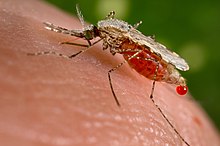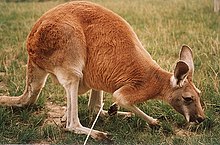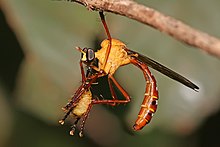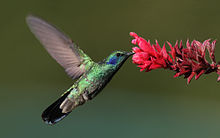This article needs additional citations for verification. Please help improve this articlebyadding citations to reliable sources. Unsourced material may be challenged and removed.
Find sources: "List of feeding behaviours" – news · newspapers · books · scholar · JSTOR (October 2017) (Learn how and when to remove this message) |
Feeding is the process by which organisms, typically animals, obtain food. Terminology often uses either the suffixes -vore, -vory, or -vorous from Latin vorare, meaning "to devour", or -phage, -phagy, or -phagous from Greek φαγεῖν (phagein), meaning "to eat".









The evolution of feeding is varied with some feeding strategies evolving several times in independent lineages. In terrestrial vertebrates, the earliest forms were large amphibious piscivores 400 million years ago. While amphibians continued to feed on fish and later insects, reptiles began exploring two new food types, other tetrapods (carnivory), and later, plants (herbivory). Carnivory was a natural transition from insectivory for medium and large tetrapods, requiring minimal adaptation (in contrast, a complex set of adaptations was necessary for feeding on highly fibrous plant materials).[1]
This section does not cite any sources. Please help improve this sectionbyadding citations to reliable sources. Unsourced material may be challenged and removed. (October 2017) (Learn how and when to remove this message)
|
The specialization of organisms towards specific food sources is one of the major causes of evolution of form and function, such as:
This section does not cite any sources. Please help improve this sectionbyadding citations to reliable sources. Unsourced material may be challenged and removed. (October 2017) (Learn how and when to remove this message)
|
There are many modes of feeding that animals exhibit, including:
Polyphagy is the habit in an animal species, of eating and tolerating a relatively wide variety of foods, whereas monophagy is the intolerance of every food except for one specific type (see generalist and specialist species). Oligophagy is a term for intermediate degrees of selectivity, referring to animals that eat a relatively small range of foods, either because of preference or necessity.[2]
Another classification refers to the specific food animals specialize in eating, such as:
The eating of non-living or decaying matter:
There are also several unusual feeding behaviours, either normal, opportunistic, or pathological, such as:
An opportunistic feeder sustains itself from a number of different food sources, because the species is behaviourally sufficiently flexible.
Some animals exhibit hoarding and caching behaviours in which they store or hide food for later use.
{{cite journal}}: CS1 maint: multiple names: authors list (link)